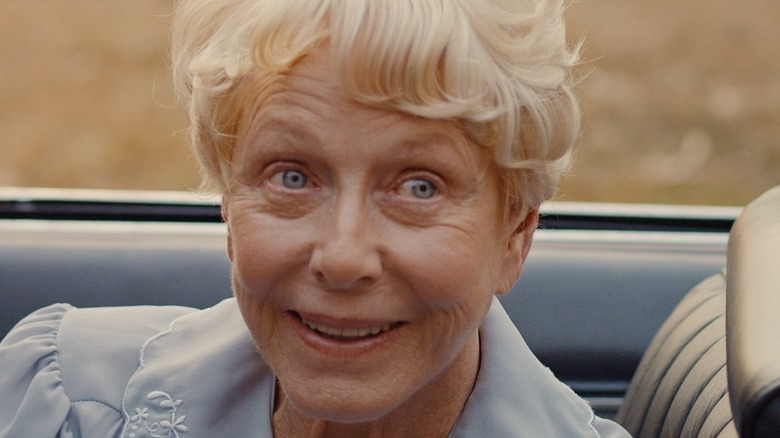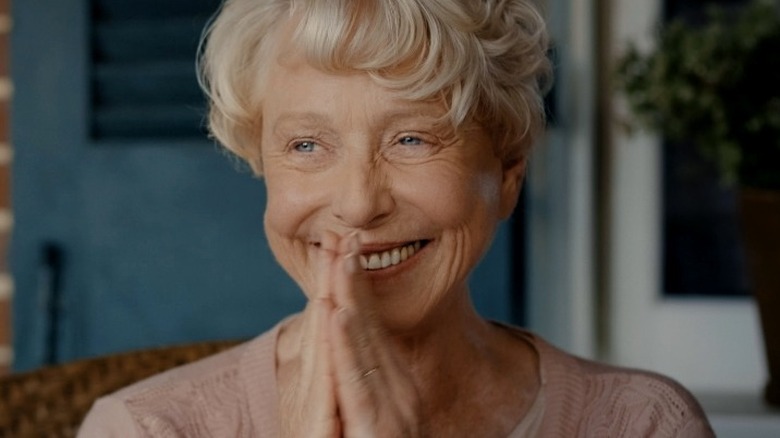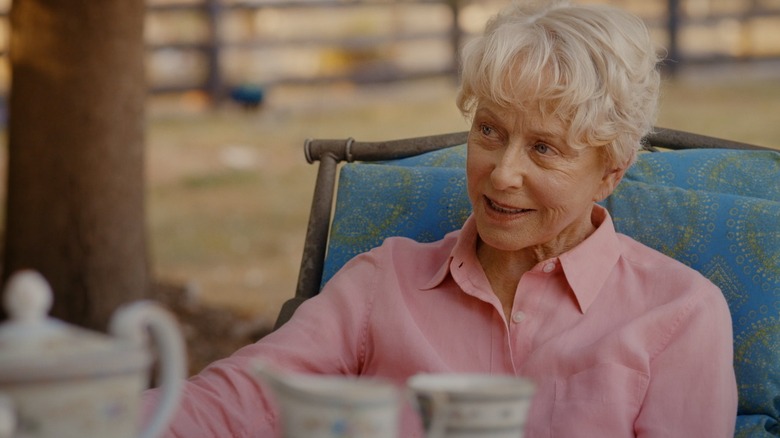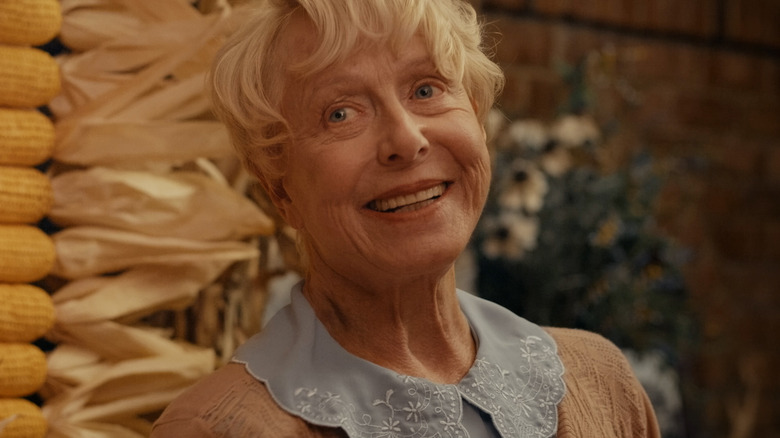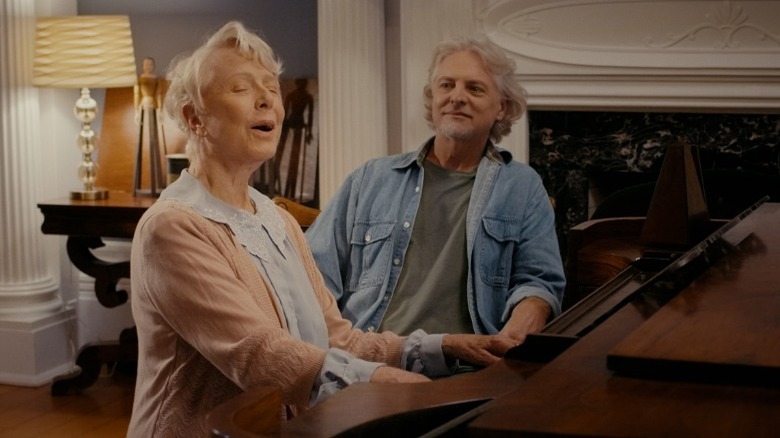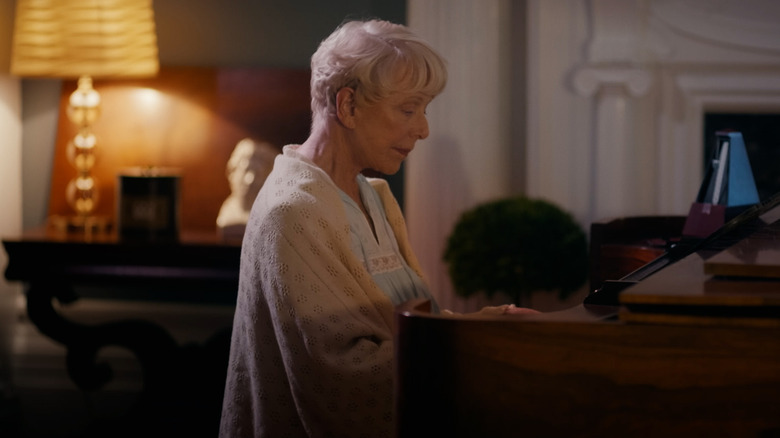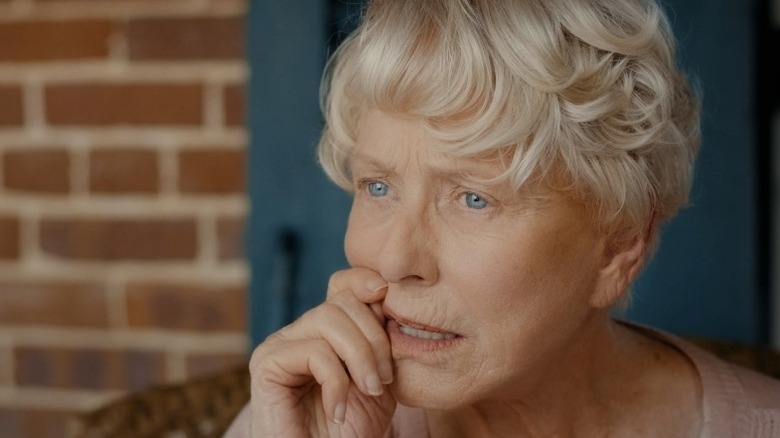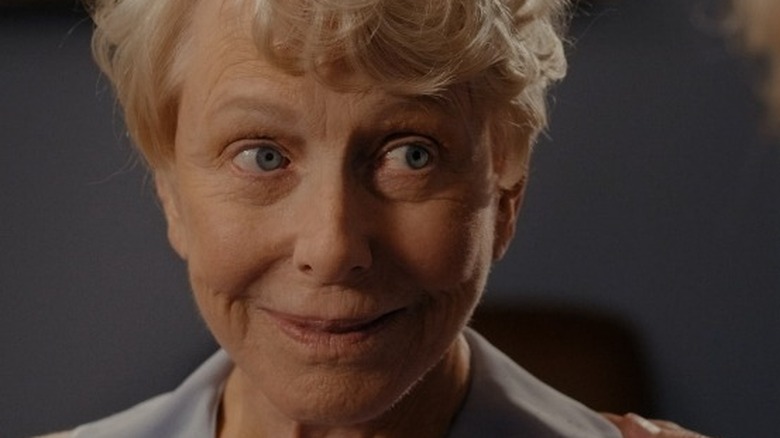Karen Grassle Explains Her Personal Connection To Her Role In Not To Forget – Exclusive Interview
We may receive a commission on purchases made from links.
Actress and activist Karen Grassle rose to notable fame with her 1974 role as Ma in the "Little House on the Prairie" series. Since then, Grassle has ventured into other projects — both on- and off-screen.
In her 2021 memoir "Bright Lights, Prairie Dust: Reflections on Life, Loss, and Love from Little House's Ma," Grassle details many of the struggles that allowed her to grow into the inspirational woman she is today. Another one of her recent projects also hits incredibly close to home. Grassle stars as a lovable grandmother named Melody in the family-friendly film "Not to Forget."
Equipped with plenty of twists and a smattering of humor, "Not to Forget" tackles a serious subject: Alzheimer's disease. And, as Grassle tells us, she has a personal connection with dementia. No matter the subject, Grassle's candor, wit, and kindness were palpable in our conversation with her.
Why Not to Forget is so close to her heart
I understand that this film [Not to Forget] is really close to your heart. I was wondering if you could explain that to me.
My own mother suffered from dementia in her very later years. She was sharp as a tack for many years and into her 80s. But she did move in with my sister and brother-in-law, and they had decided to leave Ventura [California] and go up to Washington and buy a farm. She moved into the farmhouse with them, and it was an absolutely lovely situation because she had her own little wing with her own bathroom. And on either side of the house, her grandsons were living with their young families.
So, there were young people in and out of the house all the time, just casually, so that gave her a great deal of joy. And for the first years that she was at the farm, she was able to do a lot to help my sister with the gardening, the cooking, the laundry, and all that. But as the years went by, she really, really lost her mind. She did not know who everybody was and all that. She knew that she loved them. She knew she loved us, and she knew we loved her, but she really felt like she didn't understand why she was still on earth.
She would say, "I'm just useless. I don't know why the good Lord doesn't take me." I told her, "Well, you're here so we can love you."
That's as good a reason as any.
That didn't seem to convince her. So I went through the experience of arriving and her being thrilled to see me but not being sure who I was.
That must have been really difficult.
Well, it was really sad. But, I mean, it happened over such a long period of time that we let go of her a little at a time. And then, at the end, the great blessing was that my sister and I were in complete accord when she had a trip to the hospital, and there really was no reason to do any extraordinary measures, do anything to extend her life. And in fact, she and my dad had raised us with this idea that they never wanted to be hooked up to any machines. They just wanted to go. So we were very lucky. We had a wonderful hospice organization there in my sister's county, and my mother was taken there and then died there comfortably with the family able to come and see her, and with my sister and me both with her. So I feel very, very fortunate.
Preparing for her role as Melody
That must have been a really difficult thing to go through. ... Did you get approached about playing a role in Not to Forget [due to that experience]? Or did you seek that out? What was the relationship there?
Well, my agent was working with the director for several parts in the movie, and I was one of a number of actresses I think that they were thinking of for the part. Then I wound up with it.
How did playing a role of a person who has Alzheimer's change your view of the disease at large?
Well, first of all, I read a book that was new just before the movie was made — I think it was called "Understanding Dementia" — and it was a new take on how to look at these diseases of old age in which people lose their mental capacity. And the author had had a mother who had dementia and had been, for reasons I don't recall, to the ER too many times. And every time was so hard on her as they worked on her to be sure that she was all right and then send her home again. And every time, she was in worse shape after one of those events.
So, the point this author was making was maybe we need to take a look at letting people go gently in their own time, rather than putting them through all these life-at-all-costs measures. And she also was pointing out that Alzheimer's and dementia, there are a number of kinds of dementia, and they aren't all identical. And some of the symptoms are different, and it's very important for the families to get the right diagnosis so they know what the stages of that disease are. Personally, I have a horror of losing my mind. I mean, really? That just seems like such a tough thing to go through.
Absolutely.
So, it's one thing to lose your memory of time, you're aging and all that, be less able to drive and walk and so forth. But to really not know who you are, where you are, what your life has been, I think that sounds really tough. "60 Minutes" did a fantastic group of interviews with people who were 90, I think, and then they came back and visited with them again, five or ten years later. And some of them had died, some had lost their minds. And there was one woman who had some form of dementia, I'm not sure which, who was the happiest brightest person that you could ever see.
She didn't know really who she was. She didn't really know what was happening, but she was enjoying it all. And it was the most remarkable thing to see. There's a big project about these people over 90, I think. And these interviews were done when the journalist became aware of this project. So, it was pretty interesting. I think you'll like it.
Compassion is crucial when it comes to caring for people who are living with dementia
How did it feel [playing this role since] you had a caregiving role in real life, and then when you were filming the movie, you became the person who was getting taken care of? ... That must have been emotional in some way.
Well, first of all, I have to say that my sister was the caregiver for my mother. I was living 3,000 miles away, and I only got to see her a couple of times a year, three times a year. And my sister was a gifted caregiver. She was just incredible. When she was a teenager, she had volunteered at the hospital in what they called the Peppermint Stripe Girls. I didn't know if they still have those. ... So, they would be all adorable in these peppermint-striped aprons, and they would do volunteer work of all kinds of menial tasks at the hospital. But my sister had a way with patients.
She had a cheerful way of being with them. And then my folks started a home for senior citizens in our hometown. So she worked there. So she was very, very good with old people, which frankly, I didn't have any experience with old people and I didn't have any gift for it, but she was remarkable. So I was blessed that my sister took that on and was so loyal and so great with my mom. In the movie, my character has a less advanced stage of Alzheimer's in which she's able to be up and around because she has help, she's clean, and she has the freedom of her home, and she's kind of silly about her cat and things like that. And she is generally cheerful. She's usually not suffering from a lot of anxiety.
Now, just a couple of times in the film where she becomes just overrun with not understanding what's going on. And I think that's so painful for people when they become confused and they don't know what has happened or what is happening or what their relationship is to what's happening — such a powerless feeling.
I can only imagine.
Yeah, so I had a lot of compassion for that state of mind. But really, the film is more a comedy than a tragedy ... about dementia or Alzheimer's. It's more of a family movie in which the issues are present, but they are not pushed to the degree of violence or tragedy. So, it's pretty fun.
Finding ways to overcome your struggles provides invaluable life experience
I want to know from your experience in the movie and with your own mom and this family dynamic that you have had, what do you wish [people] knew about Alzheimer's?
Well, I think as a society, we all need to realize that the population is growing older very quickly and that our health system is totally unprepared to deal with the number of people who are going to need care. People in families who don't have an issue now may have an issue in 10 years or in 20 years. Who is doing the caregiving, and how are we going to train enough people and pay them? I mean, these questions really are important and very vital for happy family life. I think, in general, none of us likes to think about it.
Of course not.
And maybe that's one of the reasons that our health system has been dragging behind where it should be for so long is that nobody wants to face it, but we really need leadership in this area.
I think that's very profound. ... I understand, kind of throughout your life, that you've confronted a lot of different struggles, and what have you found the best coping mechanisms to be?
Well, in my particular case, I grew up in a home with alcoholism, and then I developed my own alcoholism. And so, it was very important for me to get sober and find people who could help me stay sober. So I think 12-step programs and spiritual life have been key for me. I find the Al-Anon program, which is for the families and friends of alcoholics, to be incredibly helpful.
That's fantastic. Is this something you wrote about in your memoir?
Yeah, I couldn't really discuss my life without discussing alcoholism. It was there from the get-go. My dad died of alcoholism, and our life was always affected by whether he was drinking or not. 'How was he?' And for people who live with that, they become very fine-tuned to how the alcoholic is. What's the alcoholic doing? Is he drinking? Is he angry? Is he depressed? And yet orient your thinking to other people in a way that isn't healthy.
That seems like a big challenge.
Yeah, I think so. But it's a challenge that, once met, has great benefits of learning to know yourself and take responsibility for yourself, and know the difference between what is yours and what you can't do anything about.
Yeah. I mean, that's huge, but it's pretty spectacular and inspiring that you are able to discuss it. And you've kind of been through the journey yourself. I think that's inspirational.
Oh, thank you, Ally. Yeah. I've been through the mill.
The benefits of meditation
One of the other things I've just been dying to ask you is ... what kind of advice you have for just blanket hard times that people might be going through unrelated to sick parents, even unrelated to alcoholism. But just in general, people are struggling right now.
Yeah. Times are hard right now for people. I read every day something about the mental struggles that people are having with anxiety and with addiction. Oh my God.
Well, for me, learning to differentiate between what I can do something about and what I can't do anything about is very helpful. And then, for me, I've relied a great deal on psychological help, like psychotherapy. And now, I try to begin every day with a spiritual reading and a quiet meditation period, So that I set my mind in a kind of positive framework for the day. And I have found that this meditation has been just incredible in helping to even out my moods. And I've read studies now. There are studies from Harvard now that show that mindfulness meditation is able to change the actual physiological structure of the brain.
That's amazing. I love meditation. I teach yoga. I'm all about [it].
Ah, that's great. Well, yoga — that's a great example of a way that people can take care of themselves. I think physical health is so critical. And I think if there's anything I'm especially grateful for, it's that I started taking care of my physical health very young. I developed a lot of really good habits of eating right and walking, and eventually, these meditation and spiritual practices that are so good for the mind.
What kind of fitness activities are you enjoying [while recovering from] shoulder surgery?
Pilates. I used to do yoga, but I got to a place with my body where I just couldn't do it anymore. And I moved from yoga to Pilates.
Are you hoping to get back to that once your shoulder heals?
You bet.
Knowing you 'can't do it all' is actually freeing
I understand that you've been involved with activism kind of across the board in a lot of different ways throughout your life. What are you focused on right now?
I think I'm relaxing a little bit right now. Last year, I put a lot of energy into bringing that book out and talking about it and talking about activism that I had been involved in earlier in my life. And so once I knew I had to have this surgery, it was like, "Okay, then let's allow time just to heal and see what rises to the top," because there are so many serious, important issues for the planet and for people right now that you can think of 10 things every day that [you] should be doing to help something. And you can't do it all. So I have to see how this kind of settles inside me now that I don't have to focus on the book.
I will be healing, and I am healing, and I will get strong again, and then see how to focus some energy in a service way.
That's fantastic. What was the motivation behind publishing and writing your memoir?
Oh, well, I think when it started, these memories just began to come forward in a way that I couldn't ignore. And so I said, "I better write this stuff down." I had been a keeper of journals in my life. So, I had a kind of habit of writing stuff down. And then, I took a class in memoir writing, and I got really interested in it. And then, a group of us formed a writing circle, and we've been writing together and supporting each other in our writing now for over 11 years.
That's an amazing support system.
It really is. You know how hard writing is. ... So it's hard to stay with it. And many times, you write something, and you think, "This isn't anything. Is this anything to you?" You show it to your little group, and they go, "Yeah, that is something, and here's what I like about it" — and then you're off to the races. You can work again. So it's been fantastic for us, really. And now, there are four books that have come out of this group.
Staying busy despite cancer and an unprecedented pandemic
Karen Grassle on her health during the pandemic:
I had cancer during the pandemic. But lightweight. I mean, this was like-
It's still cancer!
Yeah. But I'm telling you, this was cancer light. I had this tiny, tiny bit of cancer in my breast. I took it out. I had radiation; I don't have cancer now. I take medicine, you know what I mean? But it's true, once you've had it, there are all kinds of ways in which they keep an eye on you and are alert for any changes.
When did you finish treatment?
Let's see. January of '21.
I'm so glad that you're here, you're doing great, you're healthy, and that you're going to be monitored probably very closely for a while. That's huge.
Yeah. It really is.
From what I understand, you took some time off after "Little House on The Prairie," and that your role in "Not to Forget," as I've read in different interviews and things, has been regarded as kind of a comeback. After all that time, what was the impetus behind returning to film?
I was working all the time, Ally. I never stopped working.
You can't believe everything you read, Karen.
That's right. That's right! No, so I was — even when my son was very small — I worked, for example, a job I had when he was a baby that was ideal was I was standing by for Mary Tyler Moore and Lynn Redgrave on Broadway because it was the perfect job. I had rehearsal once a week. They were performing. I was able to be with my baby a lot of the time. It was great. And I made a number of movies of the week and episodic TV and stuff like that when he was small, and I was still in L.A. And then, I left Los Angeles and started a theater company in New Mexico. And then I moved on from there to the Actors Theater of Louisville, where we lived for six years. And I was a member of the acting company doing roles from classical roles to our Vanguard brand new plates. So, I had my hand in most of the time.
Well, I'm glad we set the record straight that you have been very busy with all of these things.
"Not to Forget" is available on all major streaming platforms, including Amazon Prime Video, Apple TV, Google Play, Vudu, and Redbox. You can also keep up with Karen Grassle and her other projects by visiting KarenGrassle.net.

